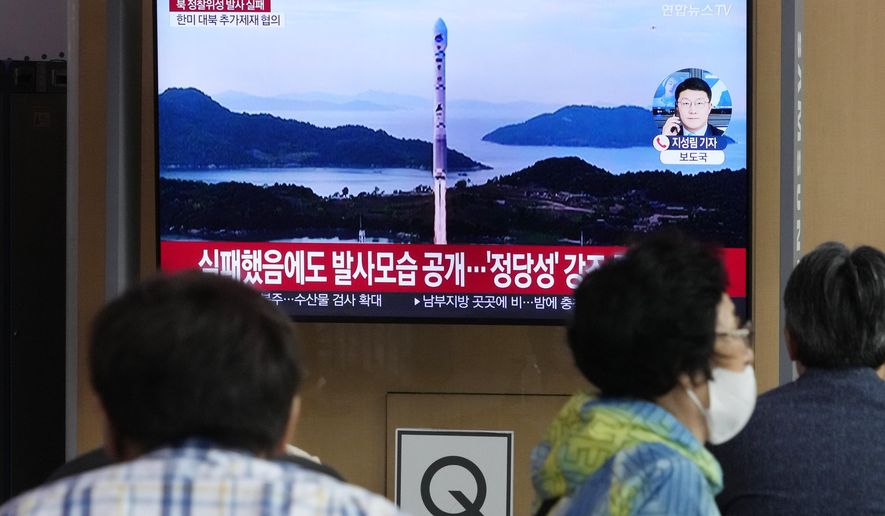OPINION:
It should be obvious that North Korea’s recent launch of three intercontinental ballistic missiles in 2023 is a message not only to the U.S. but also to China and the rest of the region.
North Korea will continue with its ballistic missile launches and, eventually, with its seventh nuclear test, knowing there are no consequences, convinced that a strong nuclear arsenal will ensure the survival of Kim Jong Un’s regime and the Kim dynasty.
Understandably, there is concern in Seoul, Tokyo and Washington regarding North Korea’s successful July 12 launch of a solid fuel ICBM (Hwasong-18) with a range of 15,000 kilometers (9,320 miles), capable of targeting the entire U.S. This was the third successful ICBM launch this year, preceded by an April solid fuel ICBM (Hwasong-18) and a March liquid fuel road-mobile ICBM (Hwasong-17).
On July 10, Kim Yo-jong, the sister of Kim Jong Un and his likely successor, accused the U.S. of reconnaissance flights that entered North Korea’s exclusive economic zone, threatening “shocking” consequences if the U.S. continues reconnaissance activities in the region.
North Korea’s Korean Central News Agency had previously criticized the planned deployment of U.S. strategic assets to South Korea as “nuclear blackmail” against North Korea and a grave threat to regional and global stability.
Given North Korea’s recently announced nuclear doctrine of the preemptive use of nuclear weapons in response to an imminent or perceived-imminent threat to the leadership or command and control, there should be a concern that North Korea may intentionally or accidentally provoke conflict in the Korean Peninsula.
A first-use preemptive nuclear policy requires exquisite intelligence to monitor and know your real or potential adversary. North Korea’s recent failure to put a reconnaissance satellite in orbit is further proof that Pyongyang’s intelligence capabilities are not at a level to ensure that they do not misinterpret an event or communique and respond provocatively, precipitating a response that could escalate quickly.
It’s this scenario that should keep us awake at night. We’re talking about the potential use of nuclear weapons, whether strategic or tactical — they’re nuclear weapons with catastrophic consequences.
In 2003, China, at the request of the U.S., got North Korea to attend the six-party talks hosted by China. Although they disbanded in 2009, the talks did result in a September 2005 joint statement that committed North Korea to complete and verifiable dismantlement of all its nuclear weapons and ongoing nuclear facilities in return for security assurances, economic development assistance, and a path to the normalization of relations with the U.S.
China was able to get North Korea to join the talks because China is North Korea’s only ally and a neighbor that provides North Korea with over 90% of its trade and crude oil and petroleum requirements. In short, North Korea is tethered to China politically and economically.
I recently joined a Track 2 (former officials and academics) with China to discuss developments with North Korea. I suggested that China should use its unique leverage with North Korea to persuade Mr. Kim to return to negotiations and halt its nuclear and missile escalation. The answer I got was a resounding no.
I was politely told that the tension in U.S.-China relations prevented China from helping with North Korea. I heard this before, but I thought that with the somewhat successful visit of Secretary Antony Blinken to China and talk about areas where China and the U.S. can cooperate, North Korea would be at the top or close to the top of the list.
This is unfortunate, because it’s in China’s interest to ensure peace and stability on the Korean Peninsula and in Northeast Asia. Indeed, persuading North Korea to denuclearize is also in China’s interest if they don’t want a nuclear arms race in the region, with South Korea and Japan, despite U.S. extended nuclear deterrence commitments, acquiring its own nuclear weapons capabilities.
Or if China is concerned, as the U.S. is, that North Korea may provide nuclear weapons to a rogue state or terrorist organization. North Korea’s previous nuclear assistance to Syria at Al Kibar should be a wake-up call to all who are concerned about nuclear proliferation.
Failure to get North Korea to halt its missile and nuclear escalation will eventually lead to greater instability on the Korean Peninsula and in Northeast Asia. This is one issue that demands immediate attention. It’s an issue that China should help resolve.
• Joseph R. DeTrani is the former special envoy for six-party talks with North Korea and the former director of the National Counterproliferation Center. The views are the author’s and not those of any government agency or department.




Please read our comment policy before commenting.